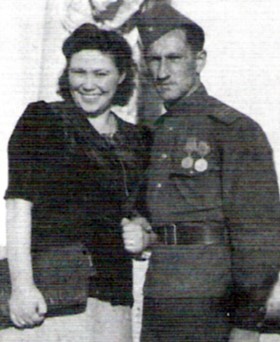Meir Toker (in Soviet official documents his name appears as Meieris Tokeris, in the Lithuanian form) was born in 1921 in the shtetl of Krakes, Lithuania. Meir graduated from a school belonging to the Tarbut network, where the teaching was conducted in Hebrew. His elder brothers left Lithuania: three – for South Africa and one -- for the Land of Israel. Meir was the only brother who remained in Lithuania, where he worked at a sawmill in the town of Kėdainiai.
Politically Meir was a leftist, who initially was enthusiastic about the sovietization of his country in 1940. However, he was soon disillusioned with the Soviet regime due to its lawlessness and, especially, the deportations to Siberia – not only of the bourgeoisie, which he could understand, but also of poor common laborers.
With the beginning of the Soviet-German war, Meir and his friends tried to flee from the rapidly advancing Germans. Leaving Lithuania, they arrived first in Latvia, where they managed to cross the old Latvian-Soviet border. By train they arrived in eastern Russia and, then, in Soviet Central Asia. In December 1941 Meir Toker was conscripted into the Red Army and sent to Kuibyshev (now Samara, in eastern Russia), where the 16th Lithuanian Infantry Division was being formed. Before Toker was enrolled in the division, he underwent a political screening by its political department: a commissar attempted to find out whether Toker had been a member of some "bourgeois" party in independent Lithuania, particularly whether he had been a member of Beitar, a rightist Zionist youth organization. Former Beitarists were handed over to the "special department" as political enemies. Fortunately for him, Meir was not Zionist, and he succeeded in being assigned, as a private, to the 167th Rifle Regiment of the Lithuanian Division. Toker recalled that one third of the men in his battalion were Jews.[1]
Toker's baptism by fire took place in February 1943 near Alekseievka (in the Oriol Region, in central Russia). In battles there, the 16th Division lost ca. 2,000 of its 10,000 men. Toker was wounded, but in a short time he returned to his regiment – as a sergeant. He acquired the specialty of a communications man and became the commander of a unit of telephonists at the communications company of his regiment. Toker recalled that being a telephonist was less dangerous than being an infantryman since infantrymen were often simply cannon fodder. Toker said that his main fear was of being taken prisoner. The Germans were especially eager to capture communications men. In July 1943 Toker was wounded again. During the fighting for Šiauliai in Lithuania, in August 1944, Toker succeeded in maintaining uninterrupted communication under heavy enemy fire. For this achievement he was awarded the Order of Red Star.
Toker was not certain about the fate of his own family, but he realized that there was little chance that they had survived the German occupation. After his native Krakes was recaptured by the Red Army, he learned that 2,000 Jews of Krakes and the vicinity, including his parents and two sisters, were murdered by Lithuanian collaborators in 1941. His family had been killed by the policeman Kibertas, with whom Toker had played on the same soccer team before the war.[2]
In January 1945 Toker was sent to an officers' course in Latvia. He accepted this assignment reluctantly since it meant that he would probably have to remain in the army for a long time. He met VE dDay in Latvia. To his good fortunate, the officers' course was closed after the victory. Having been wounded three times, Toker was released from the Army. He settled in Vilnius, where he married and worked in house construction. His wife Bella Bekerite had succeeded in fleeing from Mažeikiai, in northern Lithuania and volunteering for the 16th Lithuanian Infantry Division at the same time as Meir did.
In 1972 Meir Toker emigrated from the Soviet Union and settled in Israel. He died in 2012.







